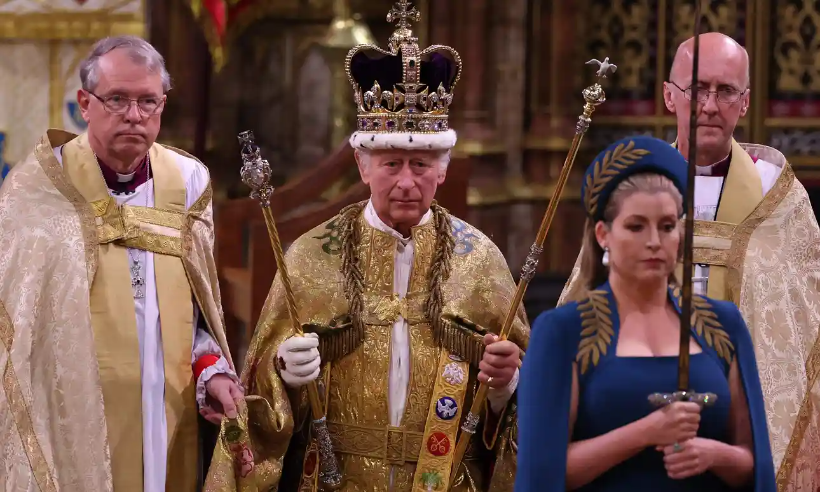New Royal Era commenced in the UK as Charles III is crowned King.
NewsOnline reports that King Charles III and Queen Camilla have been crowned at Westminster Abbey, marking the symbolic beginning of a new royal era in Britain, and a personal fulfilment for a man who has spent more than seven decades in waiting.
In a lavish and archaic ritual not seen in Britain since 1953, the king was anointed with holy oil and swore the oath of kings, before the Archbishop of Canterbury, Justin Welby, placed St Edward’s Crown on his head, to a cry of “God Save the King!”
ALSO: All Set For King Charles III Coronation As 40th British Monarch
In front of 2,300 guests including more than 100 heads of state, the king also vowed to maintain the Protestant religion in the United Kingdom and to preserve the rights of the Church of England, as set out in an act of Parliament.
Tens of thousands crammed into the Mall and along a procession route from Buckingham Palace to the Abbey, many camping overnight to secure a good view on the mile-long parade, which involved 7,000 troops and 19 military bands, the most at any state occasion since the 1953 coronation of Queen Elizabeth II.
But there were accusations of police heavy-handedness after a number of anti-royalist protesters, including the head of the UK’s leading anti-monarchy campaign group Republic, were arrested before the beginning of the procession. Graham Smith had been collecting drinks and placards for demonstrators at the main site of the protest when he was detained by police on the Strand at about 7.30am.
Up to 2,000 people gathered in Trafalgar Square beneath a statue of Charles I, who was executed in 1649, chanting and holding yellow placards reading “Not My King”. One sign read: “Don’t you think this is a bit silly?”
Peter Tatchell, the human rights campaigner, tweeted a video showing a large barrier erected in front of the protesters to shield them from the royal couple during the procession. “This is not a free country when we do not have the right to freely protest,” he said.
The human rights group Liberty said: “Protest is a fundamental right, not a gift from the state,” saying the arrests are “extremely concerning and [set] a dangerous precedent for us as a democratic nation. Our right to protest must be protected, not clamped down on.”
Another sour note was struck when Prince Andrew, the Duke of York, was booed by parts of the crowed as he was driven down the Mall. The king’s brother was forced to step back from active royal life in 2019 due to his relationship with the convicted child sex offender Jeffrey Epstein.
The king’s youngest son, Prince Harry, attended the ceremony alone, without his wife Meghan and children, Prince Archie and Princess Lilibet. It is the first time the prince has been seen with the royal family since the publication of his autobiography, Spare, earlier this year, in which he was highly critical of his father, stepmother and, brother William Prince of Wales.
He walked into the abbey behind the Duke of York and between his cousins, Eugenie and Beatrice, the duke’s daughters, and their respective husbands. He was seated two rows behind his brother, between Jack Brooksbank, Princess Eugenie’s husband, and Princess Alexandra, a first cousin of the late Queen Elizabeth II.
In his oath, the king promised to govern the United Kingdom, and the 15 Commonwealth countries where he is also head of state, according to the law, and to “cause law and justice, in mercy, to be executed”.
However, in an acknowledgement organisers had misjudged the public mood, there was a last minute change to the wording of the controversial Homage of the People, which had been included for the first time in the ceremony, but which the king’s friend Jonathan Dimbleby said he would find “abhorrent”.














